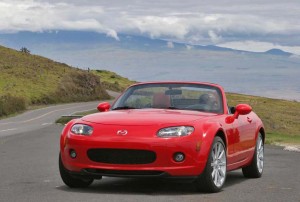Too bad they don’t let machines compete on the top-rated TV reality show, the “Biggest Loser,” because Mazda’s next-generation Miata is being put on a serious diet.
The Japanese roadster is expected to drop 720 pounds, nearly 30% of its current 2,480 mass. In fact, Inside Line quotes Mazda sources telling it the new model will be substantially lighter than the original, 1989 Miata, which weighed in at a svelte 2,178 pounds.
Most automakers have begun targeting weight as they stare down some tough new mileages standards, which climb to 35.5 mpg in 2016 and could be nudged as high as 62 mpg by 2025.
“Mass is the enemy of efficiency,” Eric Cahill, director of last year’s Automotive X-Prize told TheDetroitBureau.com.
But it’s also an obstacle to performance and handling, one reason the mantra of Lotus Cars founder, the late Colin Chapman, was to “simplicate and add lightness.”
Meanwhile, as TheDetroitBureau.com reported in April, “In the mid-term, from now to 2017 or 2018, we’ll remove anywhere from 250 to 700 pounds depending on the vehicle,” said Derrick Kuzak, Ford’s global product chief. (Click Here for the Ford weight loss story.)
Setting a tough goal is one thing, but Inside Line’s sources acknowledge it will be tough to get there, though they insist the Miata engineering team’s progress is “not bad.”
Known as the MX-5 to the rest of the world, the next-generation roadster likely won’t be much smaller considering it’s currently the smallest vehicle in its segment. But expect the use of more high-strength steel and future buyers could see some distinctly radical steps, such as the elimination of the glovebox. Even the owner’s manual might go, replaced by a memory stick.
The good news is that as a vehicle gets lighter the savings can be compounded. Shave a quarter of a vehicle’s weight and you can additionally lighten its brakes, suspension and engine. That means Mazda very well may adopt the new 1.4-liter SkyActiv powertrain, which adopts direct injection, variable cam phasing and turbocharging – and which could yield not only significantly better mileage but avoid sacrificing performance.

